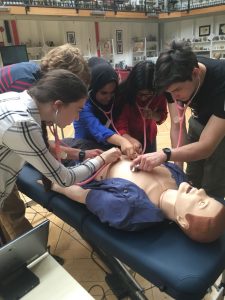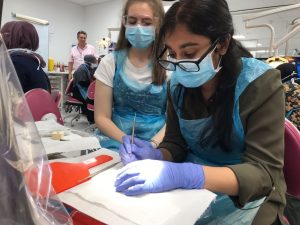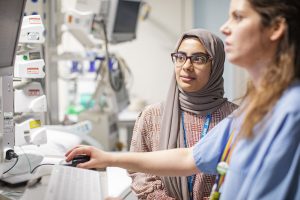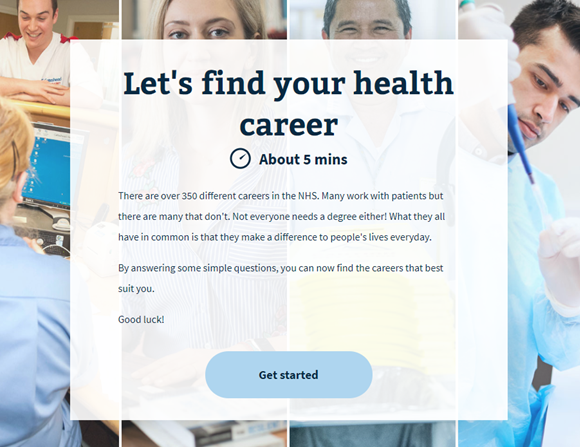Exploring your options at university – Healthcare
Contributors: Devan Mair, Emma Elliott, Carola Bigogno, Safiya Zaloum
There is an enormous range of diverse and interesting careers in healthcare – in fact there over 350 different careers within the NHS! In this blog post we’ll discuss what it’s like to study medicine, dentistry, nursing, midwifery, pharmacy and we’ll highlight the Allied Health Professions.
Medicine
 What the degree involves:
What the degree involves:
If you love immersing yourself in the science of the human body, yet also seek to apply that knowledge to helping improve the lives of those who are unwell, you may want to consider studying medicine. This degree nurtures the scientific and interpersonal skills expected of a doctor working in the NHS.
The layout is typically in 2 stages; a preclinical period of understanding the science of health and how that goes wrong in disease, then a clinical period where you spend time on placements experiencing different areas of medical and surgical life. The preclinical period involves teaching on the human body’s anatomy and physiology, taught in varying ways depending on the medical school. Some places have more lectures, others use a technique caused problem-based learning, others use a combination. Communication and clinical skills are often introduced early and reinforced with experiences on placement. The degree is standardised by the General Medical Council to ensure high quality doctors are produced across the country.
This degree is five or six years long varying between medical school, but often includes the option for undertaking an intercalated BSc; a bachelor’s degree compressed into one year as a break from medicine, in subjects differing from place to place but including neuroscience, global health and even business management.
What jobs it can lead to:
Once you graduate, you complete at least two foundation years trying out jobs in different areas before settling on an area to specialise in yourself. There are countless branches of medicine, broadly split into surgeons and physicians. What is amazing about medicine is that as you go through your course, you will pick up on what you are interested in, and where your skills lie, and there is bound to be a specialty that suits you specifically. Some common specialties you may have heard of are: General practitioner or GP, gastroenterology (digestive tract doctors), neurosurgery (brain surgery), emergency medicine (A&E) and psychiatry (specialists in mental disorders).
Medicine offers an opportunity to help people on a daily basis, and although the hours can be tough, and emotional stress high, it can be very rewarding. The career has high job security – although there are occupational risks as Covid-19 has identified. On top of the numerous specialties, there are often chances to conduct research, get involved with medical education or policy making.
Dentistry
 What the degree involves:
What the degree involves:
Dentistry is a career that exists at the intersection between science, healthcare and art; it is a creative degree that involves hand eye co-ordination and an eye for aesthetics, with an appreciation for human biology. Like medicine, a degree in dentistry involves 5 years of university education. However, unlike medicine, the degree is extremely practical and involves working with your own patients from an early stage.
A dental degree starts off in a similar way to medicine, with the first year focused on physiology, biochemistry, anatomy and pharmacology. This provides a foundation for the clinical work that follows; by the second year you are working on phantom heads with plastic teeth, learning how to use dental equipment. From the third to the fifth year you treat patients with varying complexity, making dentures, planning crowns and doing fillings. Most dental schools have separate adult and paediatric clinics, meaning by the time you graduate you have impacted and improved the dental health of many patients – a very rewarding experience.
The course is challenging; in order to do a procedure on a real person you must demonstrate proficiency on phantom heads and fake teeth. This is a real test of manual dexterity, but if you’re looking for a career that combines different passions from the arts to the sciences then dentistry is an excellent choice.
What jobs it can lead to:
A degree in dentistry opens the door to many careers, some obvious and some not. Following graduation you must spend one year as a salaried NHS foundation dentist, in order to fully complete your training. Most obviously, a degree in dentistry can lead to a career in NHS dentistry or working as a dentist in private practice. Both these careers require that you engage in ‘continuing professional development’. Dentistry is a forever changing profession and you must show that you are keeping up to date with new developments and research.
You could become a specialist in a particular aspect of dentistry that you most enjoy. Specialist training pathways come in a wide variety and you could become a specialist dentist working with root canals, crowns, dentures or paediatrics. You could become a clinical tutor or a clinical lecturer at a dental school, teaching dental students how to treat patients and spending time in research. There are also positions working for Public Health England, helping with population interventions to improve dental health in the UK.
Nursing
 What the degree involves:
What the degree involves:
A nursing degree involves learning the theory and putting it into practice on placements. You can study in one of 4 areas of nursing; adult, children, learning disability and mental health. Some degree courses offer dual qualification – the opportunity to train in 2 areas of nursing. Half of your time is spent studying at university and the other half in a range of healthcare settings gaining the practical experience required for the role, where you will be mentored by practising nurses. At university you will do a variety of group work, lectures, clinical skills classes and individual study. The first year consists mostly of theory as an introduction to important basic clinical concepts and procedures. From the second year the content of your course will be more specific to your chosen area of nursing. Topics that you can expect to cover in an adult nursing degree include public health, long-term conditions, complex care and leadership and management.
What jobs it can lead to:
Nursing is a wide and varied field with many different career options. Most people will go on to practice as a registered nurse after graduation in various fields such as in hospitals, general practice, schools, prisons, hospices and the community. Nurses work as part of the multi-disciplinary team at every part of the patient’s healthcare journey. There are lots of opportunities in a nursing career for specialization in different fields such as oncology, which often requires further study. Find out more about the different nursing roles in the NHS here. Not all nursing graduates work as nurses. There are opportunities to be a manager in healthcare or hospital trusts, strategic roles in the healthcare sector and for work in social welfare and counselling.
Midwifery
 What the degree involves:
What the degree involves:
A degree in midwifery usually starts with the theory of normal physiology of pregnancy and labour. You can expect to study modules such as midwifery care in pregnancy, birth and after birth, medicine management, critical care and complex needs, normal births, emergency births and high risk births. A large component of the degree is clinical placements in the community and in maternal units. Students focus on understanding the practical process of childbirth, but also the holistic care for women, their families and the newborns. There is a focus on health promotion as well.
What jobs it can lead to:
As midwifery is a specific degree, most graduates will go on to become midwives however the skills acquired during the degree may enable a midwifery graduate to go on to work as a community health worker. The role of a midwife is specialised to caring for women at all stages of pregnancy and delivery including the early postnatal period and recovery. Midwives usually work in a hospital or in the community. There are many opportunities to grow and become even more specialised in a particular aspect of the process, such as perinatal care or neonatal intensive care, although this will often require more training. Midwives can also be involved in the community as health visitors, in teaching and mentoring students, or in management and public health roles. Learn more about being a midwife here.
Pharmacy
 What the degree involves:
What the degree involves:
The MPharm programme is a 4 year GPhC-accredited degree followed by a one-year work placement as a pre-registration pharmacist. The main bulk of the degree is focused on understanding the pathophysiology of disease states and pharmacology of treatments as well as introducing the more practical aspects of pharmacy such as dispensing, consultation and clinical skills. The study of drug discovery and pharmaceutics alongside regulatory affairs are also central to understanding how medicines are developed from the bench to the clinic. The unique selling point of pharmacy is the expertise in medicines.
What jobs it can lead to:
Pharmacy provides a wide range of relatively new and exciting career opportunities. In addition to traditional community, hospital and industrial pharmacy roles, graduates may choose to work in supporting authorities such as the Royal Pharmaceutical Society, academia and GP surgeries. Becoming an independent prescriber within an area of their clinical competence is just one of the ways in which pharmacists are enriching their career progression. The pharmacy profession offers excellent opportunities to get involved in clinical trials, research and updating guidelines on recommendations for health and care. Regardless of the sector you may choose to work in, the patient will always be at the forefront. Over the years, the value of pharmacists in the NHS is increasingly being recognised, with emphasis on medicines management and optimisation – helping patients to get the most out of their medicines through enhanced services. Learn more about being a pharmacist here.
Allied health courses
 There is a huge range of allied health professionals that work in the NHS. Allied health professionals are essential to the NHS and include very varied roles. If you strongly feel that you want to work in healthcare but don’t feel that any of the previous options are a good fit for you, have a browse of the roles below, as there are specific degree courses that can lead to a career as an allied health professional. All of them involve working with patients and are an important part of the patient’s healthcare journey. See below a list of the NHS allied health professions, and the corresponding qualification required to work in these roles:
There is a huge range of allied health professionals that work in the NHS. Allied health professionals are essential to the NHS and include very varied roles. If you strongly feel that you want to work in healthcare but don’t feel that any of the previous options are a good fit for you, have a browse of the roles below, as there are specific degree courses that can lead to a career as an allied health professional. All of them involve working with patients and are an important part of the patient’s healthcare journey. See below a list of the NHS allied health professions, and the corresponding qualification required to work in these roles:
- Art therapists – approved Master’s degree in art (psycho)therapy
- Diagnostic radiographer – approved degree in diagnostic radiography
- Dietician – BSc in dietetics or a postgraduate degree in dietetics after a life science BSc
- Drama therapists – approved postgraduate qualification in dramatherapy
- Music therapists – postgraduate music therapy course
- Occupational therapists – approved occupational therapy course
- Operating department practitioners – 2 year diploma or 3 year degree in operating department practice
- Orthoptists – orthoptics degree course (only offered at 3 UK universities)
- Osteopaths – osteopathy degree
- Paramedics – paramedic science degree
- Physiotherapists – physiotherapy degree
- Podiatrists – MSc or BSc in podiatry
- Prosthetists and orthotists – degree in orthotics and prosthetics
- Speech and language therapists – a degree in speech and language pathology, speech science or human communication
- Therapeutic radiographer – approved degree in radiotherapy
We don’t have space to go into more detail on the allied health professions here, so if you’d like to find out more start with the NHS website.
If working in healthcare really appeals to you, but you’re not sure you want to study something really specific at this time, like an allied health course, there are other pathways into healthcare work. You can study a degree like biomedical science, and then complete the NHS Scientist Training Programme. Upon completion you can work as a clinical scientist for the NHS. You can train to work as a senior healthcare scientist in many areas, for example embryology and IVF. For more information on the huge range of clinical scientist roles, check out the this page.
Finally, If you have a specific NHS role in mind that you would one day like to go into, but are not sure what degree course to do, check out this health careers course finder tool. While we have covered a lot in this blog post, we haven’t covered any where near all the options out there! Keep researching on the NHS and UCAS websites to find your dream degree.

